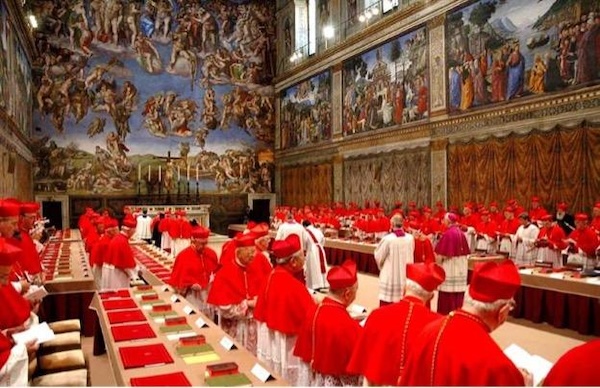This is Naked Capitalism fundraising week. 449 donors have already invested in our efforts to combat corruption and predatory conduct, particularly in the financial realm. Please join us and participate via our donation page, which shows how to give via check, credit card, debit card, PayPal, Clover, or Wise. Read about why we’re doing this fundraiser, what we’ve accomplished in the last year, and our current goal, continuing our expanded Links.
By Sascha O. Becker, Xiaokai Yang Chair of Business and Economics at Monash University, Professor of Economics at University Of Warwick, Professor of Economics, Jared Rubin, Professor of Economics at Chapman University, and Ludger Woessmann, Director at ifo Center for the Economics of Education, Professor of Economics at Ludwig-Maximilians University of Munich. Originally published at VoxEU.
Though social scientists have long questioned how religion affects economic growth, a lack of accessible data hindered their efforts. Recently, advances in computing, novel econometric techniques, and the availability of new data have enabled researchers to test how religion has influenced growth in rich and poor countries, both historically and in the present. This column argues that religion is a ubiquitous social phenomena that can spur or impair economic growth by affecting four elements of the macroeconomic production function – physical capital, human capital, population/labour, and total factor productivity.
Ever since Max Weber proposed his ‘Protestant ethic’ hypothesis in 1904-05, social scientists have questioned the role that religion plays in either enhancing or retarding economic growth. The biggest problem for such inquiries was a lack of available data and analytical frameworks for connecting the two. This is no longer true. In the last two decades, social scientists have made significant contributions to our understanding of how religion affects growth.
Figure 1 Michelangelo: The Creation of Adam

Source: https://commons.wikimedia.org/wiki/File:Michelangelo_-_Creation_of_Adam_(cropped).jpg
Religion and the Elements of the Macroeconomic Production Function
Standard growth models consider macroeconomic production functions containing several inputs that can affect economic growth. These inputs include physical capital, human capital, population/labour, and total factor productivity (TFP). In a recent survey article (Becker et al. 2024), we argue that each of these inputs can be augmented or impaired by religion. These connections emerge because religious beliefs, religious practice, religious institutions, and religious doctrine can shape individual preferences, societal norms, and economic institutions. We use the various elements of the macroeconomic production function as proximate determinants in a unifying framework to study religion as one of the deeper, more fundamental determinants of growth.
The availability of new data, advances in computing, and new econometric techniques have greatly improved our capacity to test how various aspects of religion affect each of these growth inputs in rich and poor countries, historically and in the present (see also Becker et al. 2020, 2021). Although few studies seek to understand the broader connections between religion and growth (a well-known exception being the work of Barro and McCleary 2003; see also McCleary and Barro 2019), this literature has flourished to the point that we can begin to generalise by combining and conceptually organising the results of different, often disconnected studies into a unifying framework.
Physical Capital
One of the most well-known growth inputs is physical capital, and one of Weber’s central arguments was that certain ‘Protestant traits’ – such as thrift and saving – were key to Protestant capital accumulation. Several studies suggest that there are indeed differences across religious faiths in these and other economically important cultural beliefs. Yet, the recent literature is rather mixed as to whether this is a specific value that some religions hold, or whether it only arises in certain contexts (e.g. Guiso et al. 2003, Kersting et al. 2020).
Religion also affects financial development, itself a key input into physical capital accumulation. Examples include restrictions on taking interest (Rubin 2011a, 2011b), religious law on commercial activity (Kuran 2011, Kuran and Rubin 2018a, 2018b), and religious institutions that direct capital away from more productive enterprises (Kuran 2023). All of these have been alleged to set some societies on very different growth trajectories than others.
Human Capital
Human capital has long been affected by religion and religious beliefs. Several authors have studied the effect of Islamic education on science (Chaney 2023), labour markets (Saleh 2015), and literacy (Chaudhary and Rubin 2011). Others have studied the crowding-out effect that religious education has on secular education, and its subsequent effects on industrialisation (see e.g. Squicciarini 2020, Bénabou et al. 2022, Liang 2010, Arold et al. 2022a, 2022b). Others have focused on the human capital consequences of Christian missionary activity (e.g. Gallego and Woodberry 2010, Bai and Kung 2015, Valencia Caicedo 2019).
Two faiths have been shown to be positively related to educational outcomes associated with economic growth: Judaism and Protestantism. Jews specialised in high human capital professions beginning in the centuries following the destruction of the Second Temple in Jerusalem (Botticini and Eckstein 2005, 2007), and this human capital advantage has largely persisted to the present day (with some exceptions such as Ultra-Orthodox Jews, e.g. Berman 2000).
Protestants had a cultural inclination favouring human capital accumulation from their beginnings. Martin Luther wanted his flock to know how to read so they could study the bible. This had spillovers into economically relevant human capital that gave Protestants an advantage in the economic development of the 19th century and beyond (Becker and Woessmann 2009).
Population and Labour
Religion also impacts economic growth through the channels of population and labour. The most famous labour channel is Weber’s idea that Protestants developed a stronger work ethic than others to show that they were members of the ‘elect’, who were predestined to go to heaven. Although this thesis has captured the popular imagination, the findings are mixed regarding whether Protestants in fact have a superior work ethic (e.g. Andersen et al. 2017, Spenkuch 2017).
Religion can shape a society’s demographic patterns as well. This can affect economic growth by limiting the number of children families have (thus making more resources available for investment in their human capital, see Becker et al. 2010), by hastening or delaying a country’s demographic transition (Blanc 2023), or by affecting mortality (Becker and Woessmann 2018).
Figure 2 Conclave in the Sistine Chapel

Source: https://www.thesistinechapel.org/conclave
Total Factor Productivity
A final mechanism through which religion affects growth is via its impact on the productive capacity of a society (TFP). There are several mechanisms through which religion affects productivity. One is religious belief. Religious prohibitions, especially of productive activities or technologies, can have a detrimental effect on productivity (Bénabou et al. 2022, Seror 2018, Coşgel et al. 2012). Likewise, religious tolerance can positively impact technology utilisation by opening opportunities to those who would not innovate otherwise (Cinnirella and Streb 2018, Hornung 2019).
Religion can likewise affect productivity via its effect on political economy. Religious rituals can affect productivity by shaping cultural norms and economic behaviour, as in the case of Ramadan fasting (Campante and Yanagizawa-Drott 2015) or Catholic saint day festivals in Mexico (Montero and Yang 2022). Where religion plays an important role in legitimating political rule, it is likely that religious authorities will participate in political bargaining (Rubin 2017). This can have all sorts of unintended consequences for economic growth, as the interests of religious authorities and the mechanisms of religious politics are not always aligned with prosperity (e.g. Chaney 2013, Bazzi et al. 2020). Intertwining religion and politics can also result in religious persecution, which can have negative consequences for long-run growth (Voigtländer and Voth 2012, Johnson and Koyama 2019, Miguel 2005).
Religion Matters for Growth in Multiple Ways
In both past and present, religion impinges on every input into the macroeconomic production function. Although many studies connecting religion and growth focus on narrow events, eras, and locations, the cumulative evidence from these studies is clear: religion matters for economic growth. How, when, and where it matters is context specific, but economists disregard religion at their peril.














